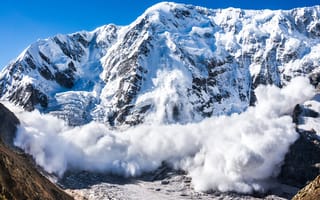
According to National Geographic statistics, avalanches claim the lives of more than 150 people every year, the majority of whom are skiers, snowboarders and snowmobilers hitting the slopes.
The BBC reports that drone manufacturers believe their unmanned aerial vehicles could help locate victims faster, and enable ski patrollers to remotely detonate explosives to clear snow on high-risk slopes as a preventative tactic.
By using drones to dramatically cut down search times, rescuers have the opportunity to reach victims buried under avalanches before it is too late. The outlet explains that more than 90% of people buried by avalanches survive if dug out within 15 minutes. At the 45-minute mark, the survival odds plummet to about 20%.
Avalanche expert Henry Schniewind tells the outlet that suffocation is a leading cause of avalanche-related deaths. "Once you're trapped, you can't move, even if you're only under 10cm (4in) of snow, and carbon dioxide quickly builds up around your mouth," he says.
Avalanche transceivers, hand-sized radio devices that emit a low-power pulsed signal when activated, are currently how rescue teams would find where avalanche victims are buried.
According to the BBC, the Czech Mountain Rescue Service (MRS) uses Robodrone Kingfisher drones fitted with cameras and its own avalanche transceiver detection system for rescue missions.
"We use drones fitted with a special system that works on the 457kHz frequency to detect avalanche transceivers," says MRS drone operator Marek Frys to the BBC.
For victims who are not wearing any kind of transceiver, innovations are underway.
"We are working on thermal and multispectral systems that can see gases such as methane and carbon dioxide and could also detect people buried in mud slides, or under rubble."
"We are working on thermal and multispectral systems that can see gases such as methane and carbon dioxide and could also detect people buried in mud slides, or under rubble," Jean-Yves Barman, chief executive of software developer SCS Smart City Swiss, tells the BBC.
Meanwhile, drones also have potential to assist patrol teams working in ski resorts who are tasked with setting off controlled avalanches to prevent the danger entirely. This work has its hazards as well. The BBC notes that two ski patrollers were recently killed in the French resort of Morillon in an accident involving explosives.
Drone regulation in the U.S., however, would prohibit drones from carrying out the controlled explosions that the prototype drone from Colorado-based Mountain Drones are capable of executing.
"Our technology is ready to go, but we've had to put development on hold because the federal government will not allow civilian operators to fly weaponised drones over US soil," co-founder Brent Holbrook explains to the BBC.



